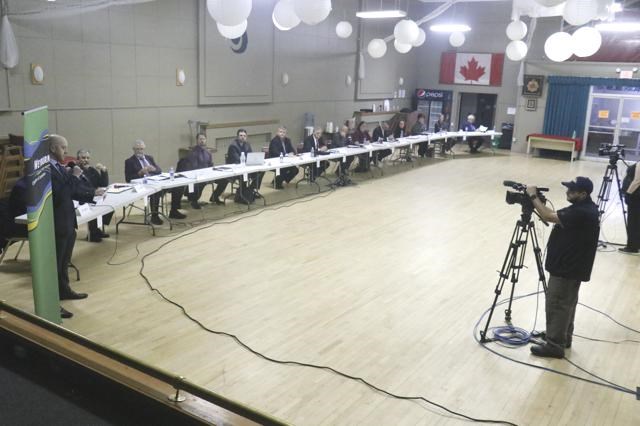Business and development issues were examined in detail at the candidates forum hosted by the Weyburn Chamber of Commerce for the upcoming municipal election, set for Nov. 9.
Fourteen of the 16 candidates running were present for the forum, which was held virtually from the Weyburn Legion Hall, as no public was allowed in due to COVID-19 restrictions.
Due to the large number of candidates, each question was posed to a grouping of three or four candidates, so not every candidate could speak on every issue. In addition, the mayoral candidates were included in with the council candidates.
One of the business-related questions asked how a candidate would help ensure Weyburn is business-friendly.
Candidate Jeff Richards was first to answer this question, pointing out he feels the city already is business-friendly, “and we should be proud of that. Are we perfect? No.”
He is proud that Weyburn doesn’t have a one-size-fits-all kind of business environment, but wants the city to be able to ask a business person what they need from the city, and how can they best be served?
John Lawrence noted that in his years working for Foreign Affairs, he has lived in many different cultures and countries. “Something that resonated with me is the active partnerships,” he said, and pointed out that Weyburn has a very active Chamber of Commerce and Economic Development committee that can help businesses out.
“The result is a civic pride that’s hard to quantify, but it’s really good for the city and for its citizens,” he said.
Dick Michel said if he were a prospective business owner, he would drive around the city and look at its infrastructure, and find out what services are like, such as police, water issues, education facilities and so on. He pointed out there are good schools here, and the Credit Union Spark Centre under construction “will bring more people here than you shake a stick at.”
A question asked how the city can help the business community move on after COVID-19, taking note that some businesses were already struggling before the pandemic hit.
Ryan Janke agreed there were economic challenges for the city, and suggested one way to help is to assist in the transfer of wealth and equity to Weyburn as people look to move here in light of the trend towards working at home. He said if people are working from home, they could do that in a community like Weyburn rather than a large city.
John Corrigan said in his response, “These are unusual times that we are in. When the pandemic hit we didn’t think it would be on this long.”
He said businesses have had to adjust to operating within COVID guidelines and have had cut costs to survive, and suggested this is something the city should also be doing. The city should also create an environment for businesses to succeed, such as with taxation.
Marcel Roy said Weyburn is well situated to help businesses move on, as Weyburn has the third lowest commercial tax rate in the province, plus a high quality standard of living, and the city is easy to work with.
Nick Coroluick said a regional economic recovery plan would have to include the district planning commission, and the city and RM need to continue working together along with Weyburn Tourism, the Weyburn Chamber of Commerce and the economic development committee, and all the resources these groups can provide.
He noted if a business wouldn’t work in the city but could in the RM, this is where working together they can help each other.
With the question of the top challenges for businesses in Weyburn, Laura Morrissette pointed out one challenge for a small business is that they don’t have the buying power that a large business has. She said with the amazing products that are available in our own back yard, the city could encourage partnerships and create larger buying groups.
Trevor Butts said, “The biggest thing we need is more consumers, which means more population.”
He noted he and Morrissette had a similar background living in Barrie, Ont., where they also had a new hospital built, and he noted they complemented that hospital with medical services, labs and clinics, and this is something the city could do is ensure there are specialty clinics established in conjunction with the new hospital to come.
Melanie Sorensen said one challenge she sees is the shift to digital platforms for shopping, and other challenges include access to a skilled work force and taxation levels. There needs to be access to education to improve the opportunities for developing a skilled work force.
She also noted that less than half of the city’s revenue comes from property taxes, so grants from the federal and provincial governments are needed to shore up their revenues.



